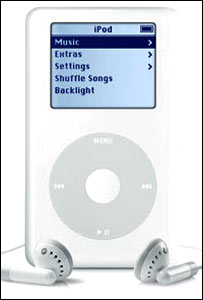
It is not the first time US students have been handed an ipod
|
Students starting their studies at Duke University in the US are to be given an Apple iPod to help them learn.
The North Carolina university said the iPods will be pre-loaded with information for new students, as well as a copy of the academic calendar.
They will also hold course material such as lecture notes and audio books.
The gift has been put together with the help of Apple which has also crafted a special version of its iTunes music store to let Duke students buy music.
Audio and visual
Each of the University's 1,650 incoming freshmen students will be given the 20Gb version of the iPod when they start the new term in August.
A further 150 iPods will be given to members of the Duke teaching staff.
In total Duke University estimates that the project will cost it about $500,000 (£270,000).
This cost includes the purchase of the portable music players, hiring someone to oversee the project, teaching costs to create material to put onto the iPods and the creation of a Duke download site.
Lynne O'Brien, director of Duke University's Center for Instructional Technology, said many lecturers at the educational institute were keen to add visual and audio elements to their courses.
She said it would also be useful for those courses where audio has always been a part.
"The iPod project will encourage faculty to experiment with adding elements such as music, foreign language and poetry to class curricula," she said.
Not the first
Duke University is not the first to give iPods out to its students. Last year about 50 of the music players were given to students at Georgia College & State University in Milledgeville, Georgia.
The iPods were used on the Gothic Imagination course to give students copies of music they had to listen as part of their studies.
The move to give students iPods could also be motivated by the fact that online music has created a big problem for universities.
Heavy student use of peer-to-peer networks, on which many people swap pirated pop, has caused havoc at many universities and sometimes swamped the bandwidth available across campuses.
